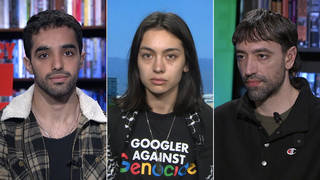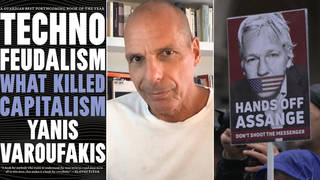
Related
Topics
The National Security Archive recently obtained declassified U.S. intelligence reports that show the Clinton administration knew as early as April 23, 1994 that the slaughter in Rwanda amounted to genocide. Senior officials used the word genocide in private but chose not to publicly to justify not intervening. [includes rush transcript]
From the National Security Archive
U.S. intelligence reports concluded that the slaughter in Rwanda ten years ago amounted to genocide as early as April 23, 1994, while policymakers debated for another month over whether to use the word publicly, according to a new report and declassified documents posted on the Web by the National Security Archive.
Obtained through the U.S. Freedom of Information Act, the documents illuminate the vast array of 'information and intelligence' available to Clinton Administration officials during the crisis, as well as the policymaking committees and working groups that used the information.
The documents reveal:
- The CIA’s top secret National Intelligence Daily, circulated to President Clinton, Vice President Gore and hundreds of senior officials, featured the slaughter in Rwanda on a daily or near-daily basis in April and May 1994, including an April 23 analysis that Rwandan rebels will continue fighting to “stop the genocide, which…is spreading south”;
- The State Department’s intelligence briefing for Secretary Christopher and other top officials saw in Rwanda “genocide and partition” as early as April 26, reporting declarations of “a 'final solution' to eliminate all Tutsis”, but the U.S. did not officially declare the killing genocide until May 25;
- U.S. officials, including Secretary Christopher and Secretary Perry, met with and telephoned counterparts such as UN Secretary General Boutros-Ghali, Gen. Romeo Dallaire, and French Foreign Minister Alain Juppe throughout the crisis, with Gen. Dallaire pleading with USAID head Brian Atwood that “without U.S. equipment, UNAMIR can do virtually nothing” to save civilians in Rwanda;
- U.S. officials met throughout April and May with human rights and humanitarian agency representatives concerned with Rwanda, including a May 17 meeting where International Committee of the Red Cross official Jean de Courten told State Department Under Secretary Timothy Wirth the “mass killings” in Rwanda compared to the “genocide in Cambodia”.
- William Ferreggiaro, consulting fellow at the National Security Archive which recently obtained classified US intelligence reports that concluded as early as April 23, 1994 that the slaughter in Rwanda amounted to a genocide. He is a also a consultant to a new PBS Frontline documentary about Rwanda entitled “Ghosts of Rwanda” premiering tonight.
Transcript
AMY GOODMAN: Title Experiment One. This is Democracy Now!, and Democracynow.org. I’m Amy Goodman with Juan Gonzalez as we talk on this tenth anniversary of the Rwandan genocide where over 800,000 Rwandans were killed. We are talking to Stephen Lewis who investigated the genocide for the Organization of African Unity, part of a panel of eminent personalities to investigate the genocide in Rwanda; and William Ferreggiaro, who is a consulting fellow with the National Security Archive which recently obtained classified US intelligence reports that concluded as early as April 23rd, 1994, the slaughter in Rwanda amounted to a genocide. Also a consultant on a new PBS Frontline Documentary called “Ghosts of Rwanda,” which is premiering tonight. William Ferreggiaro, can you outline the documents that you have gotten recently declassified?
WILLIAM FERREGGIARO: Yes, Amy. And thank you for calling them declassified, because I obtained them under the Freedom of Information Act and the agencies declassified them, so just a short plug for the efficacy of Freedom of Information. The documents themselves, I think, are important, really, in two ways. I wrote a report, and there are 53 documents on the website of the National Security Archive, which for your listeners is www.nsarchive.org, singular. I invite everyone to visit the website. I think the importance of the material is this — first, it shows the vast array of information and intelligence inputs available to senior policymakers. In other words, they had the capability to know and they did know. Some of the information that I have published up there, that you mentioned, the April 23rd report was in the National Intelligence Daily, which goes under another name now, but back then was distributed to the top several hundred policymakers within the US government. And Rwanda was an item in there, in very graphic terms, almost daily, from the onset of the crisis through the US humanitarian relief operations in July. I guess the second main point about the material is that this is really the first pieces of official evidence of senior leadership knowing and in fact meeting on Rwanda. We’re still trying to find out just exactly how many meetings there were of Clinton’s Principles Committee, which would be his National Security Council, minus his involvement and the vice president’s involvement. But there were numerous meetings of the Deputies Committee, which is the number two or three officials at each agency, meeting at the White House, and they were specifically tasked for crisis management, and Rwanda was on their agenda numerous times. So, it’s really, I think, the importance of this information shows that these individuals were not out of the loop on Rwanda, in fact, met on it. The fact that they decided not to do anything owes to other interests and other perspectives, but it’s not a question of not knowing.
JUAN GONZALEZ: Could you talk a little bit about Richard Clarke, and his role during those crucial months, and what he advised or didn’t.
WILLIAM FERREGGIARO: Sure. Mr. Clarke was a senior staff person in the National Security Council, and headed the controversial Peacekeeping Review Policy which culminated in — was promulgated as Presidential Decision Directive 25 in May of 1994, right at the height of the genocide. But it was under review from March of 1993. Clarke, as we witness now on the terrorism debate, was a very able and effective and hard-nosed bureaucratic insider, and coordinated the review of this policy. But what I would say is that he came up with the structure, and I think the intent of the structure in fact had some positive motivations. It was to say that the UN, at that point in early 1993-94, had already embarked on 18 peacekeeping missions worldwide. There just weren’t the resources for it. The US was still stuck, as Ambassador Lewis said, like much of the rest of the world, in a Cold War mindset, and was not about to undertake all additional operations. There just were not enough resources to go around, if you’re paying attention to the Koreas, the Bosnia, Russia, Haiti, for example. So, I think what happens here is Clarke leads this review, and is very effective and brings this policy forward. The president signs it. It’s promulgated. But by no means, he coordinated the policy. It was not his instigation. He served additionally on a structure under the National Security Council called the Peacekeeping Corps Group, which was comprised of mid-level officials involved with peacekeeping. So, it was his brief on the National Security Council as a senior staff member. But even to his credit, I think Mr. Clarke, who said in Samantha Power’s article, he’s not embarrassed about his role, one of the documents that I published from April 29 where he is in preparation for a Deputies Committee meeting, one of his papers going up to the representatives for that meeting says the deputies should provide direction to the Interagency Working Group on the degree of activism that they wish to encourage on further international steps aimed at addressing the slaughter and assisting refugees. In other words, the senior officials did not want to intervene, but even officials such as Mr. Clarke needed direction, and had to go back, because the information they were getting from below was so horrific that they were still — they wanted clarification on the guidance and just how active they needed to be.
AMY GOODMAN: We’re talking to William Ferreggiaro, consulting fellow at the National Security Archives, who obtained the declassified US intelligence reports. On Rwanda, can you talk about the significant of using the term genocide? If the US Ambassador to the UN, Madeleine Albright or President Clinton, or any of a number of US officials had used that term, how it would have triggered international action, and so while privately using the term, would not publicly use it?
WILLIAM FERREGGIARO: Right. I think what’s interesting is my research has indicated, that as Ambassador Lewis said and you said at the outset, that within a week, ten days, people had a real good idea that this was something of a completely different nature. So, the question of using the term, I tend to think, and others as well, that this might not have — the Genocide Convention of 1948, ratified by the US Senate in 1988, obligates signatories to prevent and punish genocide. Does that mean setting up a force to go in to places like Rwanda and stopping the genocide? I don’t think that the US or other countries would have interpreted it that way. What it would have done was created rather than a legal obligation, a political obligation. And so I think that the use of secrecy here, and the restriction of discussing this in these terms, meant that there was no political impetus from the public that would pressure Clinton into doing anything. As Samantha Power notes in her book, no president has ever suffered from not intervening to stop genocide. So, it’s really a question of raising a public pressure. You know, we have to look back. The US public was divided on Bosnia at that point. And as Ambassador Lewis mentioned at the outset, Somalia cast a huge pall over Washington, particularly with regard to peacekeeping. I think the White House, Anthony Lake and the National Security Council were very involved in the Somalia operations and the Somalia engagement, and so we’re particularly burned by that. That really sealed the deal, after acknowledging that the cold war mindset and the traditional interests in geopolitics still reigned within the Clinton administration.
JUAN GONZALEZ: Finally, I’d like ask Stephen Lewis, the former Canadian ambassador to the United Nations, a final word on the issue of reconciliation, that there are many of those who committed these atrocities, who are now being let out of jail in Rwanda, and how does a nation reach some kind of reconciliation over such a horrible past?
STEPHEN LEWIS: Let me first say that I both agree with and am fascinated by all that has just been said by your other guest because I think it is so completely corresponds with what everyone thought and assumed and intuited at the time, and yet no one would acknowledge. It’s a sad commentary on human affairs that even now people pretend that they didn’t know, that that was the fundamental problem, it wasn’t a problem of policy, it was a problem of knowledge. It was like the old business that no one knew what those trains were, or where those trains were going as they rumbled down the tracks to Auschwitz in 1944. It’s sad the way human behavior repeats itself. In terms of reconciliation, Rwanda is making actually a superhuman internal effort. It’s fascinating because it’s only ten years. Blood is still on the soil and in the hands of the killers. Yet, within the country, you have to acknowledge Kagame’s tremendous efforts using human rights commissions and truth and reconciliation commissions, using peace-education in the schools, moving heaven and earth to try to overcome the sense of fratricidal polarity in the country, and you know, they’re making real progress, it’s stunning. And because a lot of the laws being dispensed at the grassroots through a legal system called Gacaca, it’s having some effect, because it penetrates down to community level. They may make it against all odds, they may make it.
AMY GOODMAN: Well, we will continue to cover this story next week on this tenth anniversary of the genocide in Rwanda that saw up to a million Rwandans killed. I want to thank you both for being with us. Stephen Lewis, former Canadian ambassador to the UN, as well as William Ferreggiaro, consulting fellow at the National Security Archives.












Media Options